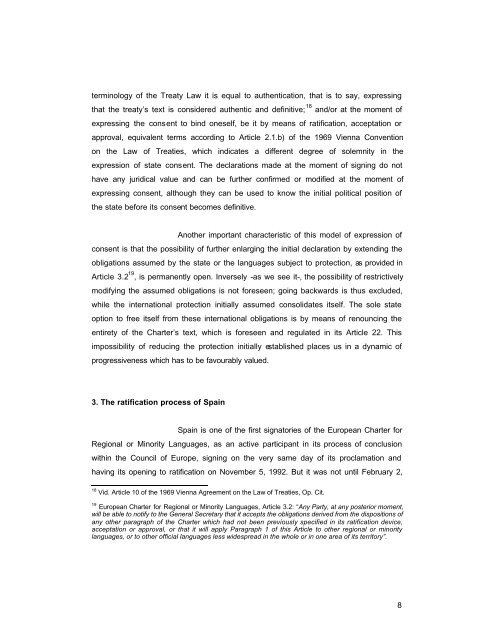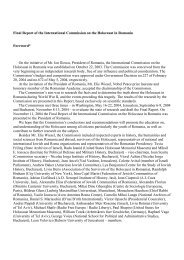get PDF document - MIRIS
get PDF document - MIRIS
get PDF document - MIRIS
You also want an ePaper? Increase the reach of your titles
YUMPU automatically turns print PDFs into web optimized ePapers that Google loves.
terminology of the Treaty Law it is equal to authentication, that is to say, expressing<br />
that the treaty’s text is considered authentic and definitive; 18 and/or at the moment of<br />
expressing the consent to bind oneself, be it by means of ratification, acceptation or<br />
approval, equivalent terms according to Article 2.1.b) of the 1969 Vienna Convention<br />
on the Law of Treaties, which indicates a different degree of solemnity in the<br />
expression of state consent. The declarations made at the moment of signing do not<br />
have any juridical value and can be further confirmed or modified at the moment of<br />
expressing consent, although they can be used to know the initial political position of<br />
the state before its consent becomes definitive.<br />
Another important characteristic of this model of expression of<br />
consent is that the possibility of further enlarging the initial declaration by extending the<br />
obligations assumed by the state or the languages subject to protection, as provided in<br />
Article 3.2 19 , is permanently open. Inversely -as we see it-, the possibility of restrictively<br />
modifying the assumed obligations is not foreseen; going backwards is thus excluded,<br />
while the international protection initially assumed consolidates itself. The sole state<br />
option to free itself from these international obligations is by means of renouncing the<br />
entirety of the Charter’s text, which is foreseen and regulated in its Article 22. This<br />
impossibility of reducing the protection initially established places us in a dynamic of<br />
progressiveness which has to be favourably valued.<br />
3. The ratification process of Spain<br />
Spain is one of the first signatories of the European Charter for<br />
Regional or Minority Languages, as an active participant in its process of conclusion<br />
within the Council of Europe, signing on the very same day of its proclamation and<br />
having its opening to ratification on November 5, 1992. But it was not until February 2,<br />
18 Vid. Article 10 of the 1969 Vienna Agreement on the Law of Treaties, Op. Cit.<br />
19 European Charter for Regional or Minority Languages, Article 3.2: “Any Party, at any posterior moment,<br />
will be able to notify to the General Secretary that it accepts the obligations derived from the dispositions of<br />
any other paragraph of the Charter which had not been previously specified in its ratification device,<br />
acceptation or approval, or that it will apply Paragraph 1 of this Article to other regional or minority<br />
languages, or to other official languages less widespread in the whole or in one area of its territory”.<br />
8












